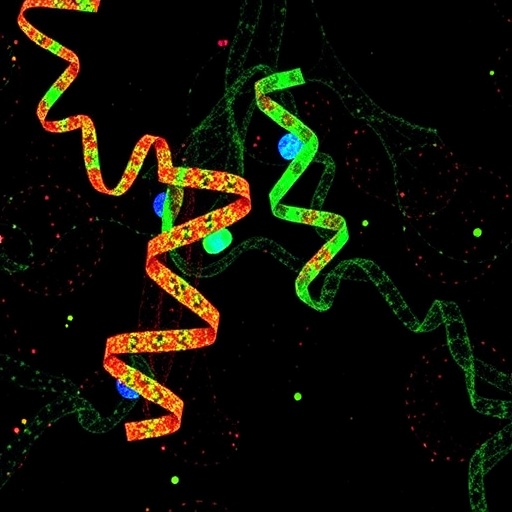In a groundbreaking study published in BMC Cancer, scientists have uncovered pivotal roles of the RNA-binding protein CMSS1 in the progression and prognosis of non-small cell lung cancer (NSCLC), shedding light on novel avenues for precision oncology. As NSCLC remains a leading cause of cancer mortality worldwide, understanding the molecular underpinnings that drive its aggressive behavior is essential for developing more effective diagnostic and therapeutic strategies.
RNA-binding proteins (RBPs) are integral players in the post-transcriptional regulation of gene expression, influencing RNA processing, stability, localization, and translation. CMSS1, a ribosomal small subunit homolog, has recently attracted interest due to its aberrant expression in various cancers, yet its specific role in NSCLC has been largely enigmatic until now. The current study employed comprehensive bioinformatics analyses, coupled with experimental validation, to elucidate the functional and clinical relevance of CMSS1 in NSCLC.
Researchers utilized The Cancer Genome Atlas (TCGA) database to identify differentially expressed RBPs in NSCLC tissue compared to normal lung tissue. Among these, CMSS1 emerged as a significantly upregulated gene. This elevated expression pattern prompted further investigation into whether CMSS1 could serve as a prognostic biomarker. Using univariate Cox regression and Kaplan-Meier survival analyses, high CMSS1 RNA levels were conclusively associated with poorer overall survival in patients, suggesting its potential as a predictive indicator of disease outcome.
To uncover prognostic robustness, time-dependent receiver operating characteristic (ROC) curves and multivariate Cox regression models were applied, confirming CMSS1’s independent prognostic value beyond traditional clinical parameters. The ability to stratify patients based on CMSS1 expression levels could revolutionize NSCLC prognosis by enabling more precise risk assessments and individualized treatment planning.
Beyond its prognostic significance, the study delved into the immunological landscape surrounding CMSS1 expression. Utilizing the ImmuCellAI algorithm, which predicts immune cell infiltration from transcriptomic data, researchers discovered a complex relationship between CMSS1 levels and immune subsets within the NSCLC tumor microenvironment. Notably, CMSS1 expression was negatively correlated with CD4+ T cell infiltration, key players in orchestrating anti-tumor immunity, whereas a positive correlation was observed with immunosuppressive populations such as regulatory T cells (Tregs) and macrophages.
This immunomodulatory association hints at CMSS1’s potential role in fostering an immunosuppressive milieu that could facilitate tumor immune evasion and progression. Such findings underscore the importance of integrating molecular and immunological data to fully comprehend tumor biology and identify combinatory therapeutic targets.
Validating bioinformatics insights, the researchers conducted experimental assays on NSCLC cell lines. Reverse transcription quantitative PCR (RT-qPCR) and western blot analyses corroborated the heightened RNA and protein expression of CMSS1 in cancerous versus normal lung cells. These molecular confirmations strengthen the reliability of database-driven discoveries and affirm CMSS1 as a bona fide player in NSCLC pathology.
From a mechanistic perspective, while the study primarily focused on CMSS1’s prognostic and immunological correlations, its designation as a ribosomal small subunit homolog positions it as a modulator of translational control. Aberrant regulation of ribosomal RBPs frequently impacts protein synthesis profiles that favor malignant phenotypes, implicating CMSS1 as a critical node in tumor-promoting gene expression networks.
The implications of targeting CMSS1 therapeutically are profound. Given its tumor-specific overexpression and influence on immune infiltration and tumor cell behavior, CMSS1 presents itself as a dual-faceted candidate for intervention. Inhibiting CMSS1 could suppress tumor growth while potentially reshaping the tumor immune contexture towards enhanced anti-tumor immunity.
This study also provides a platform for future research to explore CMSS1’s interactions with other oncogenic pathways and immune checkpoints, possibly unveiling synergistic combinations with existing immunotherapies. As NSCLC treatment paradigms increasingly embrace precision medicine, integrating CMSS1 expression profiling could guide therapeutic decisions and optimize patient outcomes more effectively.
Moreover, the research community is encouraged to investigate the upstream regulatory mechanisms governing CMSS1 expression in NSCLC, which may reveal additional targets for intervention or biomarkers for early detection. Such efforts could culminate in a comprehensive molecular framework defining NSCLC progression.
The value of this research extends beyond NSCLC, as aberrant RBP function is a hallmark of multiple cancers. Deciphering CMSS1’s role may inspire analogous studies in different tumor types, broadening our understanding of RNA-binding proteins in oncology.
In conclusion, the elucidation of CMSS1’s involvement in NSCLC progression, immune modulation, and patient prognosis marks a significant advancement in lung cancer research. This work not only identifies CMSS1 as an emergent biomarker but also as a promising therapeutic target, offering hope for improved clinical management of a notoriously lethal disease.
As the fight against NSCLC intensifies, findings such as these illuminate the intricate molecular interplay that underlies cancer’s resilience, serving as a beacon for innovative treatments that leverage the nuanced regulation of RNA-binding proteins. The translation of these insights into clinical practice could ultimately elevate the standard of care and survival rates for patients grappling with NSCLC.
Subject of Research: Roles of the RNA-binding protein CMSS1 in non-small cell lung cancer progression and prognosis.
Article Title: CMSS1: A RNA binding protein with pivotal roles in non-small cell lung cancer progression and prognosis.
Article References:
Fan, Z., Liu, W., Gao, Z. et al. CMSS1: A RNA binding protein with pivotal roles in non-small cell lung cancer progression and prognosis. BMC Cancer 25, 688 (2025). https://doi.org/10.1186/s12885-025-14044-9
Image Credits: Scienmag.com
DOI: https://doi.org/10.1186/s12885-025-14044-9
Tags: bioinformatics in cancer researchcancer mortality causesCMSS1 RNA-binding proteinexperimental validation in oncologylung cancer progression studiesnon-small cell lung cancer researchpost-transcriptional gene expression regulationprecision oncology advancementsprognostic biomarkers in NSCLCribosomal protein roles in cancerRNA processing and regulationTCGA database analyses





